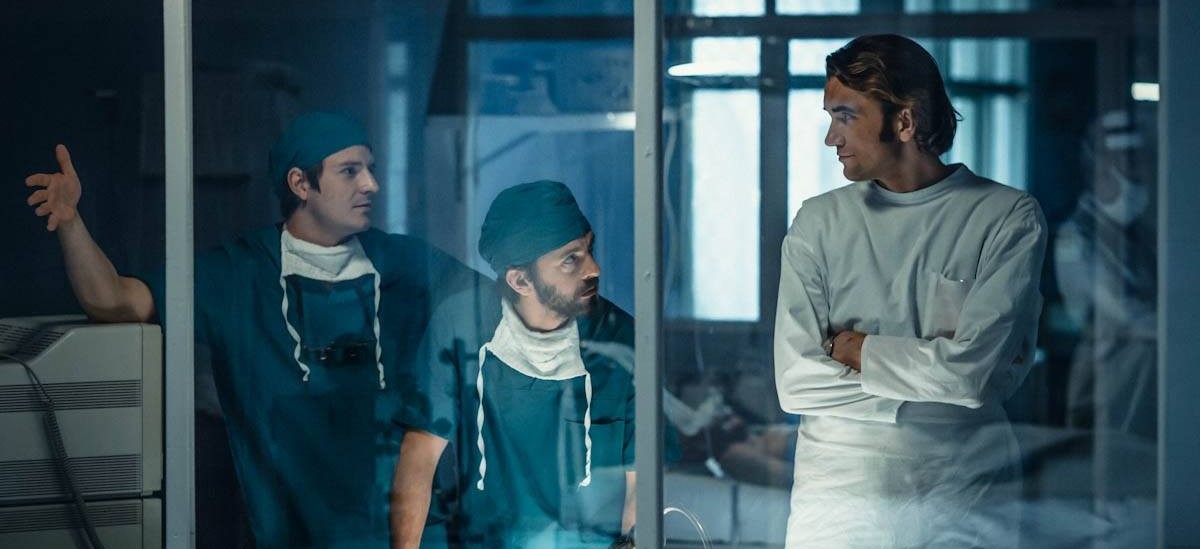Polish language film documenting the work of maverick surgeon Zbigniew Religa, as he attempts to lead the way in helping pioneer heart transplant surgery from within the confines of his desperately hard fought for clinic in Zabrze in early 1980’s Poland. There is a distinct Frankensteinian air to the core of the debate as to concerns over the morality of the surgery that the bulk of the medical profession raise (as well as in the very notable portrayal of Religa himself by Tomasz Kot) as we see the man bombarded with accusations of egotism and we witness the increasing toll that stepping into the dark against the odds takes on him.
To an extent, the film unfortunately gives credence to these accusations – we are never given the appropriate information to see how the story fits into a wider global or medical context. Almost nothing is said of the work going on elsewhere, and yet any audience has a reasonable chance of knowing the first successful human heart transplant was carried out by doctor Christiaan Barnard in South Africa in 1967 – as we see Religa struggling for success we are thereby unsure if the rest of the world has hit a roadblock, if the first success was short lived/a one off, and if this is then one man determinedly setting out to advance medical science and save lives, or if he is motivated by ego and there is a wealth of other research from elsewhere that he is ignoring. At one point he comes in and announces a solution to a part of the problem they have been experiencing – and yet it appears to have simply come out of thin air one day, inviting more questions than it answers.
Similarly, we do see some graphic images of surgery (which some viewers may find difficult), but we are never really given much in the way of scientific information about the medicine of transplants specifically nor generally, which is disappointing and denies us historical context from a medical progress point of view. Indeed, what transpires is a fairly traditional ‘hero’ film that is interesting and well acted, but is so linear that it feels almost attached to an artificial pump of its own, with the same music continually droning in trying to force the tension as our hero struggles on with nary a moment of sunshine in sight, leading us to potentially doubt the authenticity of all but the most well documented of events.
More flair was definitely needed, and although it makes sense to show that Religa wishes to remain detached from his patients, for the audience adding more emotional connection may have been a better idea as we know next to nothing about the people that are wheeled through the doors of his clinic, their lives very much in his hands. Similarly, showing most of the characters smoking fits the time period, but there was no need to take it to the ridiculous degree that it does – miring the entire movie in a nasty cliche that the industry has moved on from, as we see the main character smoke in virtually every single scene he is in, and if he isn’t smoking he’s drinking. Even if that is historically accurate (and since he was a heart surgeon, one can be forgiven for considering it a little dubious) on film it’s overkill and symptomatic of a movie trying to create a certain style that we’ve seen many times before, rather than a story that feels more real and balanced.
Still, this is a very reasonable film, it’s just a shame that the filmmakers didn’t dare to be more original and take more chances with it, or put more humanity in there to make it feel more authentic. The ending is also delivered with an anticlimactic abruptness that highlights what could have been, as we walk away reasonably sure that we’ve learned about someone of importance, we’re just not entirely sure to what degree. Interestingly, the ending also pointedly omits the fact that Religa, who sadly passed away in 2009, went on to become a very prominent figure in Polish politics, even campaigning for president before eventually giving his backing to Donald Tusk (Prime Minister of Poland from 07- Sep14, and due to become President of the European Council in exactly one month’s time) and instead becoming the minister for health – his successor, Ewa Kopacz, herself a doctor too, is currently the reigning Polish Prime Minister.

